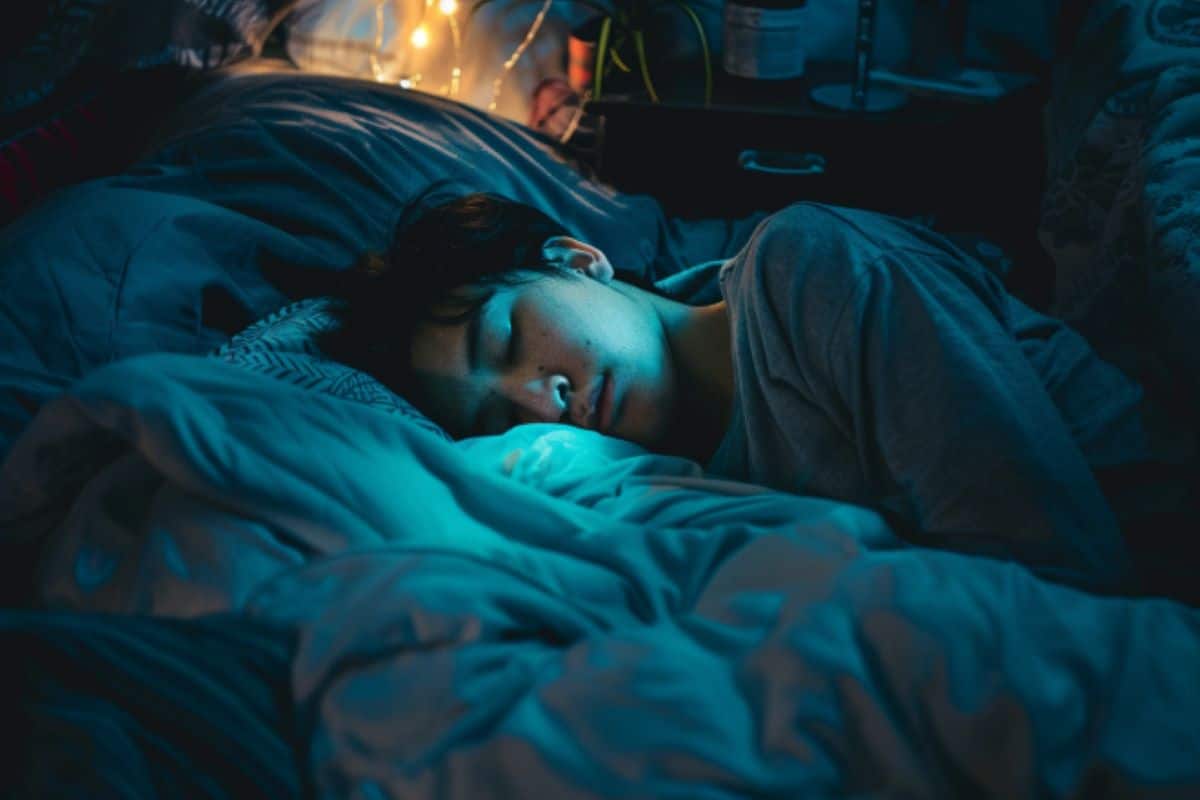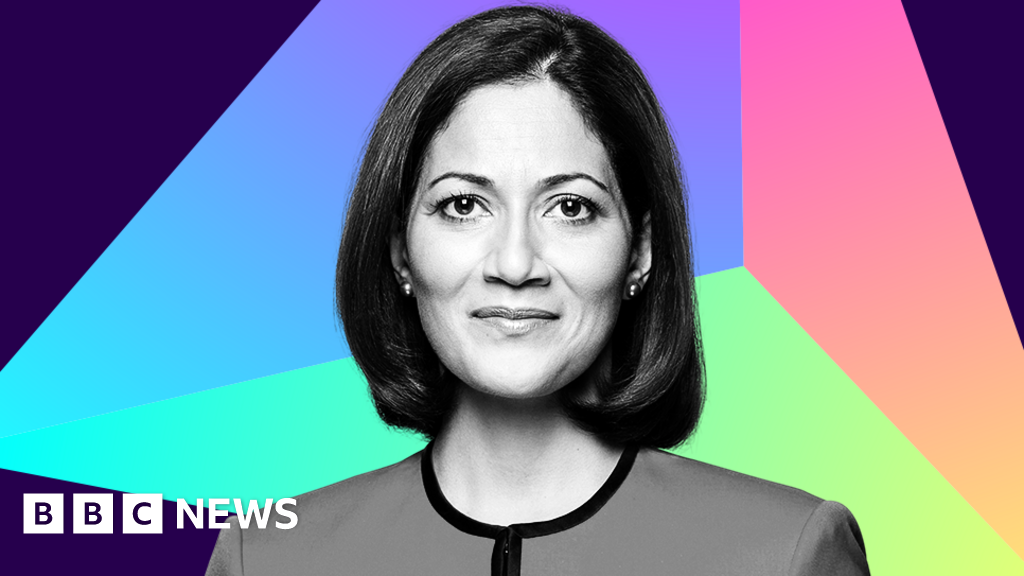Summary: Staying up late harms mental health regardless of one’s natural sleep preference. Surveying nearly 75,000 adults, researchers discovered that both morning and night types who stayed up late had higher rates of mental disorders. Surprisingly, aligning with one’s chronotype didn’t matter—early bedtimes benefited everyone. The study suggests lights out by 1 a.m. for better mental health.
Key Facts:
- Late bedtimes are linked to higher rates of mental health disorders, regardless of chronotype.
- Both morning and night types benefit from going to bed earlier.
- The study recommends sleeping before 1 a.m. for optimal mental health.
Source: Stanford
Night owls, brace yourselves. A new study by Stanford Medicine researchers has found that following your natural inclination to stay awake until the early morning hours is a bad choice for your mental health.
participants’ preferred sleep timing, known as chronotype, with their actual sleep behavior. They determined that regardless of one’s preferred bedtime, everyone benefits from turning in early. Morning larks and night owls alike tended to have higher rates of mental and behavioral disorders if they stayed up late.
The study, published in Psychiatry Research, recommends lights out by 1 a.m.
“We found that alignment with your chronotype is not crucial here, and that really it’s being up late that is not good for your mental health,” said Jamie Zeitzer, Ph.D., professor of psychiatry and behavioral sciences and the senior author of the study. “The big unknown is why.”
Renske Lok, Ph.D., a postdoctoral scholar in psychiatry and behavioral health, is the lead author of the study.
How do you sleep at night?
The findings were not quite what the researchers expected. An earlier study by Zeitzer’s team had suggested that women with cancer who slept against their chronotype had shorter lifespans.
“There is a bunch of data out there indicating that living aligned to your chronotype is very important,” he said. “That was our expectation.”
The researchers set out to study chronotype alignment in a larger population. They examined middle-aged and older-aged adults in the United Kingdom, who were asked about their sleep, including their morning or evening preference. They were sent a wearable accelerometer (basically a fancy activity monitor, Zeitzer said) to track their sleep over seven days.
The participants’ mental health was determined through their health records. The researchers included any mental or behavioral disorder listed in the International Classification of Diseases.
Among the 73,880 participants, 19,065 self-identified as morning types, 6,844 as evening types and 47,979 as somewhere in the middle.
Their sleep behavior was evaluated in relation to the whole group. The earliest 25% were considered early sleepers, the latest 25% as late sleepers and the middle 50% as intermediate. Categorizing sleep behavior this way, rather than by specific bedtimes, is more meaningful because different populations can have different sleep norms, Zeitzer said.
“If we were doing this study in college students, 1 a.m. obviously wouldn’t be that late.”
It’s all about timing
When the researchers analyzed the data, they were surprised to find that aligning with one’s chronotype was not the best choice for everyone’s mental health. It was better, in fact, for night owls to lead a misaligned life.
“I thought, “Let’s try to disprove it, because this doesn’t make any sense,’” Zeitzer recalled. “We spent six months trying to disprove it, and we couldn’t.”
The results were clear—both morning types and evening types who went to sleep late had higher rates of mental health disorders, including depression and anxiety.
“The worst-case scenario is definitely the late-night people staying up late,” Zeitzer said. Night owls being true to their chronotype were 20% to 40% more likely to have been diagnosed with a mental health disorder, compared with night owls following an early or intermediate sleep schedule.
Evening types who followed an earlier schedule fared better. Morning types who followed a later schedule suffered, but not too much.
Morning larks who rose with the sun tended to have the best mental health of all, to no one’s surprise.
The researchers found that sleep duration and consistency of sleep timing could not account for these differences in mental health.
They also tested the possibility that it was poor mental health causing people to stay up late, not the other way around. They tracked a subset of participants who had no previous diagnosis of a mental disorder for the next eight years.
During that time, night owls who slept late were the most likely to develop a mental health disorder.
Or is it about choices?
There may be many explanations for sleep timing’s link to mental well-being, but Zeitzer thinks it likely comes down to the poor decisions that people make in the wee hours of the morning.
Many harmful behaviors are more common at night, including suicidal thinking, violent crimes, alcohol and drug use, and overeating.
One theory, known as the “mind after midnight” hypothesis, suggests that neurological and physiological changes late at night can foster impulsivity, negative mood, impaired judgment and more risk-taking.
That might explain why even late at night, morning types seem to have an advantage—they’re out of their comfort zone.
“If I had to hazard a guess, morning people who are up late are quite cognizant of the fact that their brain isn’t working quite right, so they may put off making bad decisions,” Zeitzer said.
“Meanwhile, the evening person who is up late thinks, ‘I’m feeling great. This is a great decision I’m making at 3 o’clock in the morning.’”
Another explanation could be a social misalignment with the mainstream chronotype.
“Maybe there are fewer social constraints late at night because you have fewer people around who are awake,” Zeitzer said.
That is especially true in places like the United States and the United Kingdom, where people tend to be more isolated in the evenings. In a Mediterranean culture, where nights are more gregarious, staying up might even be good for mental health.
Though Zeitzer advises night owls to go to sleep before 1 a.m., he knows it’s easier said than done. Getting sunlight in the morning and sticking to an earlier routine every day of the week could shift your sleep patterns, but it doesn’t change your chronotype. “Biologically speaking, it’s very much like a rubber band—you take a day off and you snap back to where your body wants to be,” he said.
His team plans to examine whether particular late-night behaviors, rather than timing per se, are linked to poor mental health.
“If you like being up late and just do what people normally do at 10 p.m., but you do it at 2 or 3 a.m.—maybe that’s not a problem,” he said.
But what’s the fun in that?
About this mental health and chronotype research news
Author: Nina Bai
Source: Stanford
Contact: Nina Bai – Stanford
Image: The image is credited to Neuroscience News
Original Research: Open access.
“Perils of the nighttime: Impact of behavioral timing and preference on mental health in 73,888 community-dwelling adults” by Renske Lok et al. Psychiatry Research
Abstract
Perils of the nighttime: Impact of behavioral timing and preference on mental health in 73,888 community-dwelling adults
Mental health is independently influenced by the inclination to sleep at specific times (chronotype) and the actual sleep timing (behavior). Chronotype and timing of actual sleep are, however, often misaligned. This study aims to determine how chronotype, sleep timing, and the alignment between the two impact mental health.
In a community-dwelling cohort of middle- and older-aged adults (UK Biobank, n = 73,888), we examined the impact of chronotype (questionnaire-based), the timing of behavior (determined with 7-day accelerometry), and the alignment between the two on mental, behavioral, neurodevelopmental disorders (MBN), depression, and anxiety, as assessed through ICD-10 codes.
As compared to morning types with early behavior (aligned), morning types with late behavior (misaligned) had an increased risk of having MBN, depression, and anxiety (p’sp p = 0.04) and anxiety (p = 0.05).
Longitudinal analyses, in which the likelihood of developing de novo mental health disorders was associated with chronotype, behavioral timing, and alignment between the two, confirmed cross-sectional findings.
To age healthily, individuals should start sleeping before 1AM, despite chronobiological preferences.

Sarah Carter is a health and wellness expert residing in the UK. With a background in healthcare, she offers evidence-based advice on fitness, nutrition, and mental well-being, promoting healthier living for readers.








